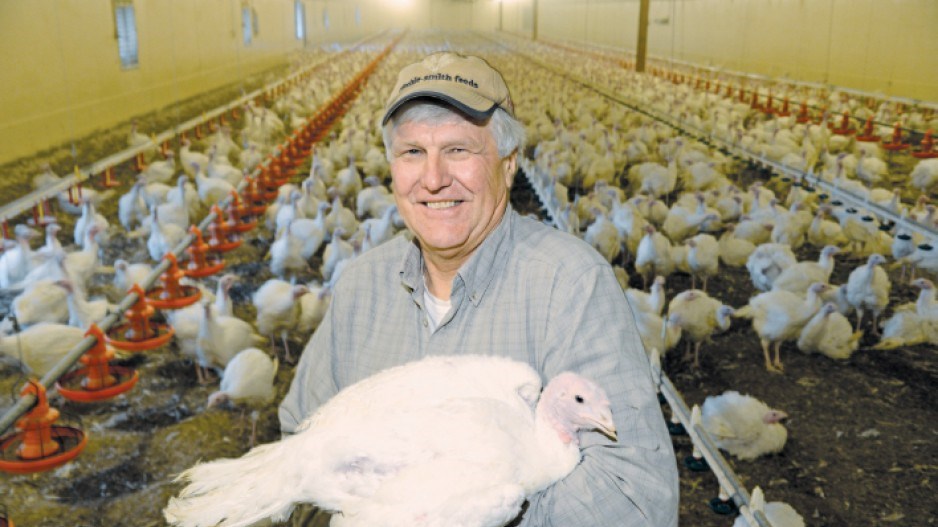BC's turkey growers have much to be thankful for as their peak season approaches, consumers gobble holiday dinners and their marketing board provides their recipe for success: limited production, guaranteed prices and the ability to restrain farmers in the United States from diluting the gravy boat.
Cattle ranchers and hog farmers only wish they had it so good.
B.C.'s 64 turkey growers enjoy reliable profits from sales of about $39.1 million while their regulator and marketing authority, the BC Turkey Farmers (BCTF), limits entry to the sector by allowing only two new entrants each year.
Each licensed grower gets a slice of the approximately 24 million kilograms of turkey the BCTF is allowing to be produced in B.C. this year.
"We're profitable, but it's not a large profit," said North Bluff Farms owner Vic Redekop. "It's just a dependable profit."
Redekop is producing about 1.6 million kilograms of turkey meat this year, making him one of B.C.'s largest turkey growers.
The Turkey Farmers of Canada (FTC) annually mandates the country's production threshold. National production is up 9.5% this year while consumption is projected to be up 8.9%. The TFC then allocates production quotas to provinces for regulators to distribute to growers.
Because B.C. has recorded several years of stable turkey sales, its 3% production hike in 2013 is less than farmers elsewhere in Canada.
That's better than the plight of B.C.'s dwindling number of 20 hog farmers, who last year lost money because of high feed costs and unbridled competition, mostly from U.S. hog farmers keen to get their snouts in the Canadian trough by selling to B.C. retailers intent on paying the lowest price.
Turkey growers are protected from imports, but there is no outright ban on U.S. turkey coming across the border. In fact, about 7% of turkey on B.C. store shelves is from the U.S., BCTF spokesman Michel Benoit told Business in Vancouver. That makes Canada the ninth largest importer of foreign turkey, by volume, in the world, he added.
"European Union and other countries allow a lot less in imports than we allow," he said.
Jim Vercammon, University of British Columbia professor of food and resource economics, said there is an essential 7%-market-share ceiling on U.S. turkey imports because a tariff then rises from being negligible to being several times the price of the turkey.
He added that if Canada had no restrictions on turkey imports, the country would be flooded with cheap U.S. turkey.
According to U.S. National Turkey Federation's statistics, a glut of turkey south of the border prompted the U.S. government to bail out farmers by buying 120 million pounds of turkey for food banks and school lunch programs so far this year.
"One new trend is that Canadians eat a lot more dark turkey meat," said Mountain View Poultry owner Shawn Heppell, who is producing about 1.3 million kilograms of turkey meat this year.
"Canada and the U.S. used to be a white breast-meat market. In the past few years, that's been turned on its head. Now Canadians really want more dark meat."
Heppell said Canada historically has exported most of its dark turkey meat. The fastest-growing segment of the overall market is ground turkey for meat patties – a blend that is about 70% dark meat, he added.
Dunkin' Donuts rolled out turkey sausage breakfast sandwiches in April, and Heppell expects more chains to follow because the fat content in turkey is substantially less than other meats. •




